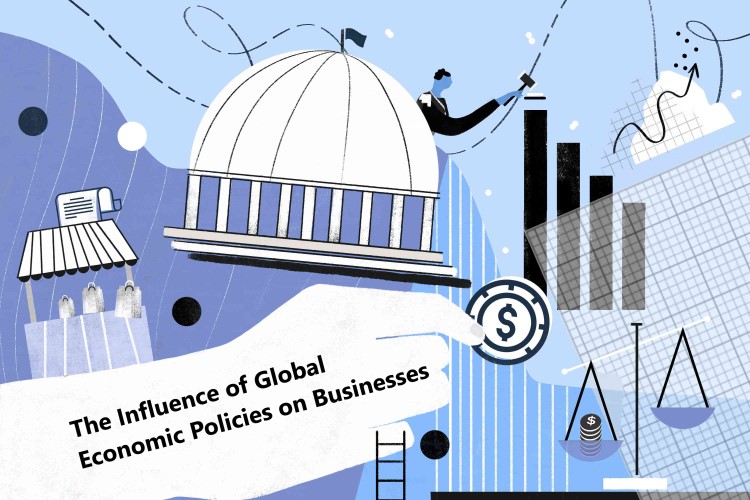 The influence of global economic policies on businesses is significant and shapes how companies operate across borders. From trade agreements to monetary regulations, these policies affect everything from supply chains to investment decisions. Understanding how international regulations impact costs and profitability is essential for business leaders. Changes in tariffs, interest rates, and tax laws can quickly shift market conditions. As a result, staying informed about global economic policies helps you make strategic decisions and manage risks effectively. In today’s interconnected world, adapting to these policies is key to maintaining competitiveness and achieving long-term success.
The influence of global economic policies on businesses is significant and shapes how companies operate across borders. From trade agreements to monetary regulations, these policies affect everything from supply chains to investment decisions. Understanding how international regulations impact costs and profitability is essential for business leaders. Changes in tariffs, interest rates, and tax laws can quickly shift market conditions. As a result, staying informed about global economic policies helps you make strategic decisions and manage risks effectively. In today’s interconnected world, adapting to these policies is key to maintaining competitiveness and achieving long-term success.
Overview of Global Economic Policies and Their Importance
Global economic policies refer to the rules and regulations that govern international trade, investments, and financial systems. These policies play a critical role in shaping business environments around the world. From tariffs and trade agreements to currency controls and environmental regulations, economic policies directly impact how businesses operate across borders. As a result, companies must stay informed about these policies to adapt and remain competitive.
The influence of global economic policies is significant. For example, trade policies can affect access to international markets, while monetary policies influence exchange rates and inflation, impacting costs. Investment regulations can also encourage or deter foreign investments, shaping how companies expand into new regions. These policies create both challenges and opportunities, forcing businesses to constantly adjust their strategies.
Ultimately, understanding global economic policies helps you make informed decisions about market entry, pricing, and investment strategies. Businesses that actively monitor and respond to policy changes can better navigate economic fluctuations. This knowledge allows you to minimize risks and seize opportunities, enhancing your ability to thrive in a globalized economy.
The Impact of Trade Policies and Tariffs on Businesses
Trade policies and tariffs have a direct impact on global supply chains, influencing costs and market access for businesses. Tariffs, which are taxes on imported goods, can raise the cost of raw materials and products. This, in turn, increases production costs for companies that rely on international suppliers. As a result, businesses may need to raise prices or find alternative suppliers to maintain profit margins.
Trade agreements also play a crucial role in shaping business operations. Free trade agreements can lower or eliminate tariffs, making it easier for businesses to access new markets. However, protectionist policies, which aim to shield domestic industries from foreign competition, can limit market access. These policies can lead to higher costs and reduced competitiveness for companies that rely on exporting their products.
The influence of global economic policies is clear when looking at the ripple effects of trade policies. Changes in tariffs or trade agreements can disrupt supply chains, alter pricing strategies, and affect overall profitability. By staying informed and adaptable, you can minimize the negative impact of these policies and capitalize on new opportunities in the global market.
Monetary Policies and Their Influence on Business Operations
Monetary policies, including interest rates, inflation control, and currency exchange rates, significantly affect business operations. When central banks raise or lower interest rates, borrowing costs for businesses change. Higher interest rates increase the cost of loans, which can reduce investments in growth, equipment, or expansion. On the other hand, lower rates make borrowing cheaper, encouraging businesses to invest more.
Inflation control also impacts your business. If inflation rises, the cost of goods and services increases, affecting operating expenses and pricing strategies. Stable inflation allows businesses to plan more effectively, while high inflation creates uncertainty, leading to unpredictable costs and reduced consumer spending power. Inflation control measures by governments and central banks can either stabilize or disrupt business environments.
Currency exchange rates influence international transactions, especially for businesses that import or export goods. Fluctuations in exchange rates can make international products more expensive or cheaper, impacting profitability. The influence of global economic policies is evident in how these monetary tools shape decision-making. Companies must monitor these factors closely, adjusting strategies to mitigate risks and capitalize on opportunities in a changing financial landscape.
Taxation Policies and Corporate Profitability
Taxation policies have a significant impact on corporate profitability, especially for businesses operating internationally. Corporate tax rates vary across countries, influencing where companies choose to set up operations or headquarters. Lower corporate tax rates in certain regions can make those locations more attractive, as they allow businesses to retain more of their profits. Conversely, higher taxes may reduce profitability and influence companies to explore alternative markets.
International tax policies, including how governments regulate cross-border transactions and tax treaties, also play a major role. Businesses must navigate complex tax structures when expanding globally, ensuring compliance while minimizing tax liabilities. Tax havens, or countries with favorable tax laws, can sometimes offer a legal way for corporations to reduce tax burdens. However, these strategies are increasingly under scrutiny, as governments push for greater transparency and fairness in corporate taxation.
The influence of global economic policies is clear when considering the role of taxation. Businesses must carefully design their tax strategies to balance compliance with profitability. By staying informed about changes in tax policies, your company can optimize its global operations and maximize profits in an evolving economic landscape.
Environmental and Sustainability Regulations
Environmental and sustainability regulations, such as carbon taxes and green initiatives, are increasingly shaping corporate strategies. These policies aim to reduce carbon emissions and encourage sustainable practices. For businesses, compliance with such regulations often means adjusting their operations to be more eco-friendly. This can involve adopting cleaner technologies, reducing waste, and improving energy efficiency.
The influence of global economic policies becomes evident with carbon taxes. Governments use these taxes to impose a cost on carbon emissions, which directly impacts industries with high carbon footprints. Businesses that rely heavily on energy-intensive processes face higher costs if they do not invest in cleaner alternatives. On the other hand, companies that adopt sustainable practices early can gain a competitive advantage by reducing costs and improving their brand reputation.
Sustainability initiatives, such as green certifications or government incentives for renewable energy use, can also offer opportunities for businesses. While meeting environmental standards might increase upfront costs, it can lead to long-term savings and better alignment with consumer demand for sustainable products. By adapting to these global environmental policies, businesses can enhance their profitability while contributing to a more sustainable future.
The Role of Economic Policy Uncertainty in Business Decision-Making
Economic policy uncertainty can have a significant impact on business decision-making. When policies change frequently or political instability increases, businesses often face challenges in planning long-term strategies. Companies must evaluate potential risks, such as new regulations or shifts in trade agreements, that can affect their operations and profitability. This uncertainty forces businesses to be more cautious with investments and expansion plans.
To navigate these challenges, many companies adopt flexible strategies, such as diversifying their markets or building stronger cash reserves. This helps them respond to unexpected changes in the economic landscape. Additionally, businesses often keep a close watch on political developments and consult with experts to anticipate potential policy shifts. The influence of global economic policies is particularly evident in times of uncertainty, when companies must adapt quickly to avoid potential losses.
In global markets, economic policy uncertainty can also lead to delays in decision-making. Businesses may postpone launching new products or entering new markets until the situation stabilizes. By staying informed and agile, you can minimize the impact of economic policy uncertainty and position your business for success despite the challenges.
Conclusion
In conclusion, the influence of global economic policies on businesses is far-reaching and affects every aspect of operations, from supply chains to profitability. Navigating trade policies, monetary shifts, and environmental regulations requires careful planning and adaptability. As businesses face economic policy uncertainty, staying informed and responsive becomes even more important. By understanding these global policies and their impacts, you can make better strategic decisions and position your business for long-term success in an ever-changing economic landscape.


